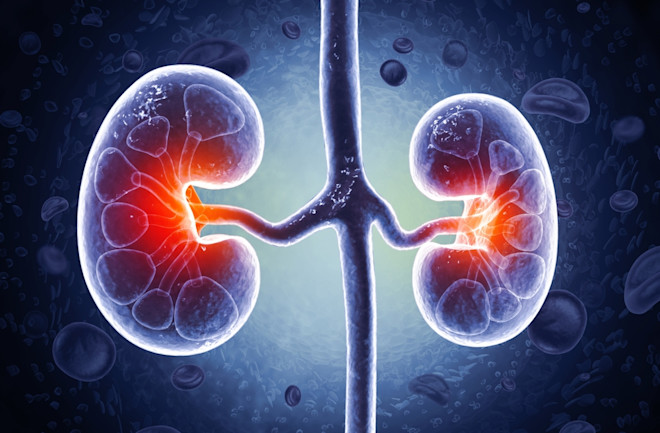Globally, it is estimated that around 10 percent of the world’s population has chronic kidney disease, or over 800 million people. Unfortunately, it is one of the leading causes of death. Many people may have the disease without realizing it so it is important to understand the disease, its progression, and risk factors.
What Is Chronic Kidney Disease?
Put simply, chronic kidney disease is when the kidneys have suffered damage over a sustained period of time and don’t work properly. When healthy, our bodies two bean-shaped kidneys play a vital role in removing waste products from the body and maintaining a normal blood pressure, amongst more.
If damaged over time – usually assessed as three months or more – the kidneys may not be able to carry out these tasks which can lead to other health complications and ultimately, in some cases, kidney failure.
Symptoms of Kidney Disease
Symptoms of kidney disease depend on the stage (discussed below). At early stages there may be no symptoms and unfortunately, they may not present until the disease is advanced.
Symptoms can include dark and foamy urine, an increase in urination, pain in the lower back, fatigue, loss of appetite, restless leg syndrome, nausea, vomiting, muscle cramps, changes to skin color, and more.
Causes of Kidney Disease
Chronic kidney disease has multiple causes and can be linked to other diseases. Though any one can develop the illness, risk factors include diabetes, high blood pressure, smoking or using tobacco products, heart disease, and a family history of chronic kidney disease.
Those over the age of 60 may also be at greater risk of developing kidney disease. As it can develop without showing symptoms, medical experts suggest that those at higher risk should get checked.
Read More: The Health Dangers of Chronic Dehydration
How Is Kidney Disease Diagnosed?
Blood and urine tests are commonly used to diagnose chronic kidney disease. Usually multiple tests over a period of time – of around three months – are needed to confirm the diagnosis.
Blood tests are used to assess creatinine levels. This waste product is produced by the muscles and healthy kidneys filter it out. If a person’s kidneys are damaged, however, this doesn’t happen. Blood samples can help doctors assess the kidney’s filtration rate; known as the estimated glomerular filtration rate.
Similarly, urine tests check for creatinine and a substance called albumin. This test helps doctors assess the urine albumin-creatinine ratio. Albumin is a protein that is normally kept in the bloodstream but when the kidneys are damaged it can pass into urine. High levels may indicate a risk of chronic kidney disease.
Together, these two tests can provide an accurate picture of a person’s kidney health and repeated tests are usually needed to identify chronic kidney disease. Those who are at higher risk – such as the elderly – may have regular blood checks to test for chronic kidney disease.
Read More: What Do Your Blood Test Results Mean?
Stages of Chronic Kidney Disease
Chronic kidney disease is generally broken down into five stages and is identifiable by the estimated glomerular filtration rate mentioned above.
Stages 1 and 2: These stages indicate low to mild kidney damage but can be difficult to pinpoint as there are often few, if any, symptoms.
Stage 3: Stage three means mild to moderate loss of kidney function. Though many people may not present any symptoms at this stage some can begin to manifest such as pain in the lower back, swelling, or blood may appear in urine.
Stage 4: At this stage, the kidneys are severely damaged, resulting in a high risk of kidney failure and heart disease. It is associated with a wider range of symptoms.
Stage 5: The kidneys are severely damaged and may have lost their ability to filter waste from the bloodstream, resulting in kidney failure. Also known as end-stage kidney disease, this may require either a kidney transplant or dialysis.
Read More: 5 Top Breakthrough Medical Technologies and How They Changed The World
Treatment for Chronic Kidney Disease
Treatment for chronic kidney disease depends on the stage at which it is identified and the cause. There is no cure for the disease but steps can be taken to slow its progression an further declines in kidney function. Not all those with chronic kidney disease will suffer from kidney failure.
A range of medications may be prescribed to treat problems associated with kidney disease such as high blood pressure, cholesterol levels, or high potassium. Lifestyle changes – such as stopping smoking, reducing alcohol consumption, losing weight, improving sleep quality, increasing physical activity, and eating a healthy diet – may also be advised. For later stages, treatment may include either a transplant or dialysis if the kidneys have failed.
Read More: The People Making Organ Transplants More Efficient
Article Sources
Our writers at Discovermagazine.com use peer-reviewed studies and high-quality sources for our articles, and our editors review for scientific accuracy and editorial standards. Review the sources used below for this article:
The Lancet Global Health. The major global burden of chronic kidney disease
Kidney international supplements. Epidemiology of chronic kidney disease: an update 2022
Cleveland Clinic. Chronic Kidney Disease
National Library of Medicine. Chronic Kidney Disease
BMC Nephrol. Chronic kidney disease and its health-related factors: a case-control study
Mayo Clinic. Chronic Kidney Disease
National Health Service. Diagnosis
National Kidney Foundation. Stages of Chronic Kidney Disease (CKD)
American Kidney Fund. Blood test: eGFR (estimated glomerular filtration rate)
National Kidney Foundation. Kidney Failure Risk Factor: Urine Albumin-Creatinine Ratio (uACR)
Kidney Care UK. Stages of kidney disease
National Kidney Foundation. Stage 4 Chronic Kidney Disease (CKD)
National Kidney Foundation. Stage 5 Chronic Kidney Disease (CKD)
National Health Service. Treatment
Mayo Clinic. Kidney Transplant
Sean Mowbray is a freelance writer based in Scotland. He covers the environment, archaeology, and general science topics. His work has also appeared in outlets such as Mongabay, New Scientist, Hakai Magazine, Ancient History Magazine, and others.

